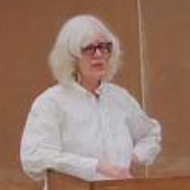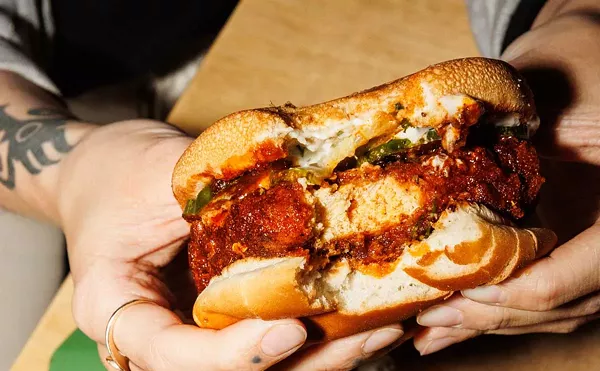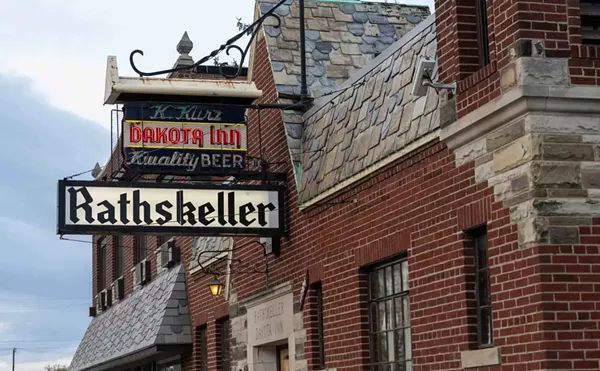
Audio By Carbonatix
[
{
"name": "GPT - Leaderboard - Inline - Content",
"component": "35519556",
"insertPoint": "5th",
"startingPoint": "3",
"requiredCountToDisplay": "3",
"maxInsertions": 100,
"adList": [
{
"adPreset": "LeaderboardInline"
}
]
}
]
Over a steaming vat of soup set up in a tiny triangular downtown park comes the invitation: "We’re having lunch – do you want to have lunch with us?"
Each Saturday, members of Food Not Bombs, a direct-action collective, invite passers-by to join them for a midday meal. From a folding table at State and Griswold in Detroit, the late teens-early 20s activists hand out cups and plates of vegetarian food they’ve prepared themselves, from ingredients donated by sympathetic merchants.
Detroit Food Not Bombs – there are groups in Hamtramck and Ann Arbor too – is part of a loosely connected international movement dedicated to opposing militarism and feeding the hungry.
"I got interested," says Wayne State student Lydia Pittaway, "when my friends and I realized that people are starving every day, not just on Thanksgiving and on Christmas. The government is not providing for people, which is what they were set up to do, so the community needs to step in. Food is a builder of community. So we just started up a chapter."
The first Food Not Bombs group was founded in Boston in 1980, as an outgrowth of the anti-nuclear movement. Today 175 autonomous chapters in North America, Europe and New Zealand gather food that would otherwise be thrown away.
"By giving away free food to people in need in public spaces, we directly dramatize the level of hunger in this country and the surplus of food being wasted," reads one Web site. "We also call attention to the failures of the society to support those within it while funding the forces of war and violence, including the police."
The Detroit group serves all vegan food – no meat, eggs or dairy. Veronica, who is from Mexico, explains that this is because meat production is wasteful: The resources needed to raise one cow could support many more people eating vegetables.
"It’s better for people’s digestion too," adds Pittaway.
In two hours on New Year’s Day, the group served perhaps 30 people with lentil soup, rice, and potatoes with onions. In warmer weather, when more people are on the streets, their clientele is between 50 and 100.
All are welcome at the Food Not Bombs table. Some of those who accept soup fit the profile of the homeless or the down-and-out, others don’t.
Most are first-timers. One man says it’s the best lentil soup he’s ever had and offers some of the incense he’s selling in return. Another, waiting for the Grand River bus that will take him to a friend’s house "to do some charity work," eats his fill. An older man who saw the activity from his apartment window says he didn’t feel like cooking for himself – he takes a plate back to his room to finish watching Papillon. A mountainous woman named Ernestine tells Veronica, "Muchas gracias ‘spanol." A cheerful guy on a motor scooter seems surprised – "This food is really good!" – and sticks around to chat.
All the people I ask say they’re not familiar with vegetarian food, but they praise the meals. The soup is thick and good, the tasty rice cooked with tomatoes, onions, garlic and potato.
Soup is always on the menu; summertime might feature pasta salad. Ali Hussin says he’s sometimes made the Egyptian national dish: A fava bean salad with onions, tomatoes, cumin, garlic, lemon, parsley and olive oil, wrapped in Arabic bread.
"All of it went, every bit of it," he says proudly.
The Food Not Bombs members see their work not as charity but as profoundly political.
"We had on one of our leaflets," says Ali, "for a person to ask for a bowl of beans and rice once a day is like to start a revolution."
Two members went to Seattle for the anti-World Trade Organization protests, and the group is participating in a "World Trade Opposition" coalition in Detroit. Naturally, they’ve volunteered to serve free food at the coalition’s public event next month.
In some other cities, Food Not Bombs members have been hassled by the police. Members of the San Francisco group say they’ve been arrested nearly 1,000 times in the past seven years.
Detroiters haven’t had that problem. City Health Department rules require a food service license, but free food programs by nonprofit groups such as churches often fall under the radar.
The group gets regular donations from Whole Foods Market in Ann Arbor, produce from the Cass Corridor Food Co-op, and bread and sweets from the Avalon Bakery, where some collective members work. Avalon co-owner Jackie Victor says, "They don’t waste time on marketing and PR; they just quietly do their work. It’s like a no-administrative, no-overhead, direct-service direct-action.
"I see them doing a piece of the solution, but also drawing parallels to what has to happen for every person to be treated with respect and dignity."
![]()
Detroit Food Not Bombs would like to serve in more locations on more days. For that it needs more people and more food. The group accepts individual food and money donations, but merchants who can donate regularly every week would be most appreciated. Call 313-832-0114 for more information, or e-mail pigpen0666@aol.com.






